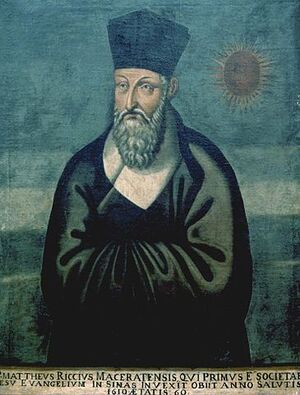Matteo Ricci (nonfiction)
Matteo Ricci, S.J. (Italian pronunciation: [matˈtɛːo ˈrittʃi]; Latin: Mattheus Riccius Maceratensis; 6 October 1552 – 11 May 1610), was an Italian Jesuit priest and one of the founding figures of the Jesuit China missions. His 1602 map of the world in Chinese characters introduced the findings of European exploration to East Asia. He is considered a Servant of God in Roman Catholicism.
Ricci arrived at the Portuguese settlement of Macau in 1582 where he began his missionary work in China.
He became the first European to enter the Forbidden City of Beijing in 1601 when he was invited to become an adviser to the imperial court of the Wanli Emperor, the first Westerner to be invited into the Forbidden City. This honor was in recognition of Ricci's scientific abilities, chiefly his predictions of solar eclipses, which were significant events in the Chinese world. He established the Cathedral of the Immaculate Conception in Beijing, the oldest Catholic church in the city. Ricci was given free access to the Forbidden City but never met the reclusive Wanli Emperor, who, however, granted him patronage, with a generous stipend and supported Ricci's completion of the Zhifang Waiji, China's first global atlas.
He converted several prominent Chinese officials to Catholicism, such as his colleague Xu Guangqi, who aided in translating Euclid's Elements into Chinese as well as the Confucian classics into Latin for the first time.
In the News
Fiction cross-reference
Nonfiction cross-reference
External links:
- Matteo Ricci @ Wikipedia

